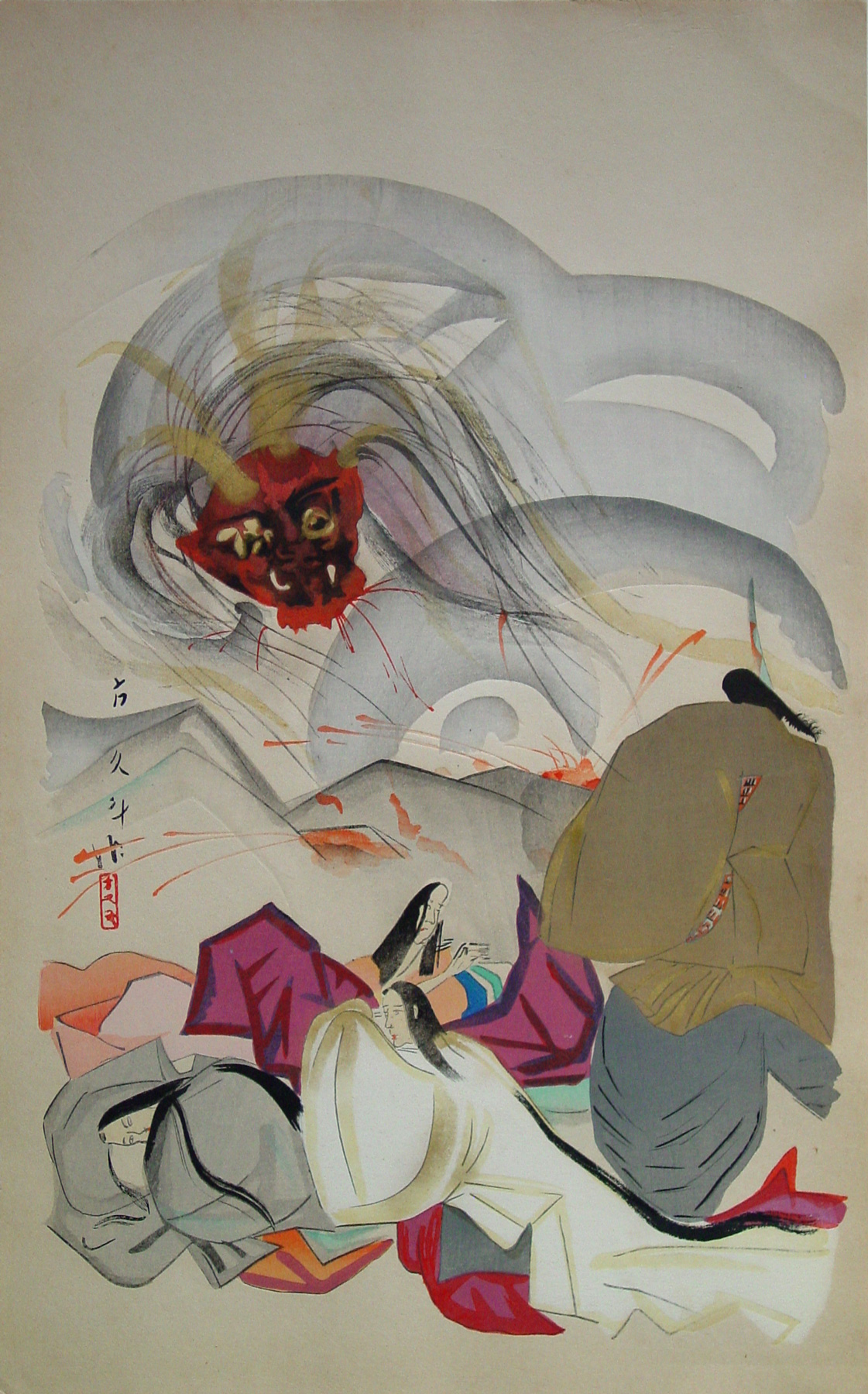About This Print
This print, titled The Spirit of the Wine, shows four characters from the play Gonza the Lancer imbibing wine at the bottom of the print. A huge dragon spirit has emerged in a roiling cloud, the head of the dragon in red with gold horns and swirling gray cloud matter. Blood splatters throughout the center of the print.This print is one of several in the eighteen print set Woodblock Print Supplements to the Complete Works of Chikamatsu that lack the simulated brocade border.
The Story of Shuten Doji
A reference to Shuten Dōji appears in Chikamatsu's work Gonza the Lancer (Yari no Gonza), where the Narrator states: "Above their heads rises Oe Mountain, where Minamoto vanquished the demon." The demon being referenced is Shuten Dōji.1Source: The website of Manuel Paias http://www.man-pai.com/Notas/Shuten_doji_e.htm
Shuten Doji, or the Spirit of Wine, was the leader of a group of bandits that roamed the region around Kyoto, stealing and kidnapping women and girls, taking refuge in an inexpungible fortress in the mountains. Frightened, the people asked protection from the Emperor. In order to end this state of affairs the Emperor sent one of his trusted generals, Minamoto-no-Raiko (948-1021), who chose a small group of warriors, one of which was Kintaro (who had taken the name of Sakata Kintoki).They started their journey disguised as priests. First they found a woman who taught them the road to the fortress. They then met an old man, who was in fact a disguised god. He told them that once inside the fortress they will be invited to a banquet where wine would be offered to them, wine they should not, in any circumstance, drink.
Once at the fortress they were received by some bandits who took them to a great banquet hall where a handsome young man received them graciously and ordered his servants to prepare a banquet in their honor. Impressed by him, the men started to doubt if he could be the one they sought. However, they followed the advice given to them - whilst pretending to drink they poured away all the wine.
The banquet lasted several hours, but finally their host fell asleep. Already prepared, Minamoto-no-Raiko and his men approached him and tried to subdue him. He then transformed himself into a giant demon. A terrible fight followed, but the determination and courage of the group of warriors won, and they defeated the demon, whom they killed. They then captured the bandits, released the women and girls abducted, and recovered the stolen treasures.
"Woodblock Print Supplements to the Complete Works of Chikamatsu"
One of 18 prints published from 1922 to 1923 as part of the celebration of the two-hundredth anniversary of the death of Chikamatsu Manzaemon (1623-1724), perhaps the greatest dramatist in the history of the Japanese theater. Each design illustrates a scene or character from one of Chikamatsu’s famous works. For more details on this series go to Woodblock Print Supplements to the Complete Works of Chikamatsu.
1 The Major plays of Chikamatsu, translated by Donald Keene, Columbia University Press, 1961, p. 295.
Print Details
| IHL Catalog | #118 |
| Title or Description | The Spirit of the Wine (Shuten Dōji) |
| Series | Supplements of the Complete Works of Chikamatsu Manzaemon Dai Chikamatsu zenshu furoku mokuhan 大近松全集 付録木版 |
| Artist | Tamamura Hokuto (1893-1951) |
| Signature |  |
| Seal | 方久斗 Hokuto (as shown above) |
| Publication Date | between 1922-1923 |
| Edition | likely first edition, but the number of editions issued is unknown |
| Publisher | Dai Chikamatsu zenshū kankōkai 大近松全集刊行会 (the Complete Work of Chikamatsu Publishing Association) |
| Carver | Yamagishi Kazue 1893-1996 |
| Printer | Nishimura Kumakichi |
| Impression | excellent |
| Colors | excellent |
| Condition | excellent |
| Miscellaneous | all prints from this series printed on a light tan-colored paper |
| Genre | shin hanga (new prints) |
| Format | dai-oban |
| H x W Paper | 18 x 11 1/8 in. (45.7 x 28.3 cm) |
| H x W Image | |
| Collections This Print | The Tsubouchi Memorial Theatre Museum of Waseda University 201-0384 and 201-0385 |
| Reference Literature |


